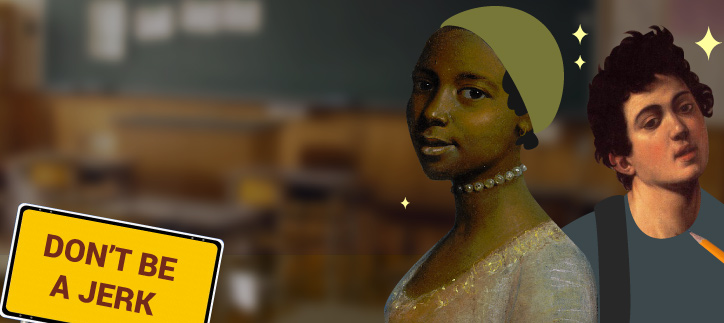Looking for more PBIS resources? Check out all of our Teacher Guides and Online Courses here.
In a world of reality TV, it's easy to forget that things like "integrity" and "honesty" exist. Spoiler alert: the two rivals don't really hate each other, the big fight at the finale was staged, and America's choice is rigged. What show are we talking about? All of them. We're talking about all the shows.
So power down the screens (then turn them back on for all the resources we provide) and use our teaching guide to remind students about the qualities of integrity and honesty.
In this guide you will find
- those resources we mentioned, including two very different people who have very different views on integrity: Worf the Klingon and Joan Rivers.
- discussion questions about cheating, gossip, and plagiarism, i.e., all the things that make for good TV, but bad integrity.
- activities exploring moral codes, including the students' own codes and the codes of others. (Not the Konami code.)
Our teaching guide keeps it real: real honest. And unlike marathoning your favorite reality TV show all weekend, it lets you maintain your integrity. (Don't worry, we won't tell your students.)
DAY 1: YOURSELF
Introduction
The individual is the smallest unit of any social construct that's going to making its own decisions. At least until some kind of Body Parts situation comes to pass (hurry it up, science). So this is where you'll start. Plus, it's easier for students, being the rugged individualists they believe themselves to be, to understand the problem at home.
The first day's activity is about common, accepted wisdom as a foundation to a moral code. So you'll divide up the students in groups and have them poke holes in famous truisms.
Key Skills and Learning Objectives
- Tell the truth.
- Take a stand. Not the stand.
- Do the right thing, especially when no one is watching.
- Keep promises.
- Justice for all.
Homework
- Yesterday: None.
- Today: Complete your handout. Talk to your parents about their personal moral codes. Write them down and analyze whether they're now part of your moral code.
MORAL CODES
Materials Needed: Pencils. Paper. Integrity.
Estimated Time to Complete: 50 minutes
[The purpose of this exercise is to talk about the basics of moral codes. Yes, this is probably something best done at home, but that doesn't mean you don't have to do it. Sorry.]
Since I assume everyone knows the difference between the truth and a lie, we're going to move right into integrity and how it relates to moral code.
First, I want to define integrity. Can anyone help out? [Maybe they can, maybe they can't.] Integrity, in something like a building or a boat, means it's built well. For a building, it would mean that it wouldn't fall down easily. For a boat, it means that it's solid enough to keep the water out. This is what a moral code is: integrity for a person. If you have integrity, you have a strong moral code that doesn't collapse immediately or spring holes with no provocation.
The second point in the reading was all about "taking a stand." Does anyone know what that means? [A few wavering hands. If you want, see if you can cobble together a meaning. If not, read on.] A stand is a figure of speech. Essentially, it means that once you decide what's right and wrong based on your moral code, you do what you can to support that.
Moral codes vary widely by culture, religion, and between people. You can have people of the same race, religion, culture, and creed who espouse wildly different moral codes. [Red alert: when discussing moral codes, you're right next-door to a discussion of politics, and you might as well just set your contract on fire then and there. It won't help anyone to get into that discussion. So don't. Stick with the stuff most people are fine with declaring wrong.]
[Divide the class up into five parts and give them a truism to discuss. "Honesty is the best policy," "Two wrongs don't make a right," and so on. Have them examine it from every angle. Can they think of a situation where it doesn't apply? And if not, why not? Have them present the findings to the class, and open it up to discussion. If one kid says, "Do what thou wilt shall be the whole of the law," keep an eye on that kid.]
The handout will be a discussion of your own moral code. Pick a couple points that you believe in. Then, write why this is the basis of your personal code and if you can think of any exceptions.
HOMEWORK
Talk to your parents about their moral codes. Find out why they believe what they do. They might have some good reasons. They have, after all, been alive longer than you. Write down a few of the points, and then in short paragraphs, analyze the pros and cons of each belief. At the end, decide if this will become part of your personal code. Don't worry; it's not binding.
DISCUSSION AND ESSAY QUESTIONS
- Can you think of a situation where it's okay to lie?
- What is the difference between honesty and integrity?
- Why is cheating wrong?
- Can you think of a situation where it's okay to cheat?
- Have you ever violated your personal moral code? Why? How did it make you feel?
- What's more important: being perceived as being moral or being moral? What's the difference? Can you be both?
- Can you think of a situation when it's harder to do the right thing? Why would you do the right thing in that situation?
- There are situations where breaking a promise is preferable to keeping it. Can you think of a situation like that?
- Can you think of a situation where two wrongs do in fact make a right?
- What is the primary inspiration for your moral code? Is it the same as one already existing or did you modify it? If you chose to modify it, how did you choose?



